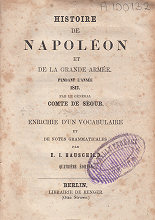
SÉGUR : Napoleon's Russian campaign (fülszöveg)
No great military campaign has stimulated the interest and the imagination of men more than Napoleon's disastrous invasion of Russia in 1812. Among all the accounts of this great event, the Comte de Ségur's has long been one of the most reliable and dramatic. Now for the first time in over fifty years it is made available to the American public in a new translation and an edition which omits only tedious detail or repetitions which would bore the modern reader.
The Comte de Ségur was born in 1780. His father had been Ambassador to Russia and his grandfather a Marshal of France and Louis XVI's Minister of War. As a young man of nineteen, impoverished by the Revolution, Ségur earned his living writing plays. He was a victim of the frustrations facing his class in the late days of the Revolution when, one day in 1799, he saw Napoleon emerge with a bodyguard of cavalry from the Palais des Tuileries. The glamour of this figure snapped Ségur out of his lethargy, and he decided to become a soldier. Bonaparte made him a lieutenant, and in a few years the young man rose to be a general and aide-de-camp to the Emperor. It was in this capacity that he went on the Russian Campaign of 1812.
Napoleon's Russian Campaign begins with the Grand Army poised on the banks of the Niemen ready for the invasion of Russian soil. It follows the campaign closely, with dramatic chapters on the great Battle of Borodino (or the Moscowa River), the capture and burning of Moscow, and the tragic retreat.
This classic account of a world-famous event presents, in addition to the story of the erosion of the Grand Army, a study in Napoleon's disintegration. Ségur is, of course, a great admirer of the Emperor, but he is detached enough to see that the spark of Austerlitz and Marengo was no longer alive in 1812, and to admire greatly the stamina, self-control, and strategy of Kutuzof. There are striking portraits of Murat, Ney, and the other great generals, but the focus is on Napoleon.
|
|

|
|
| KATALÓGUS | TARTALOM |